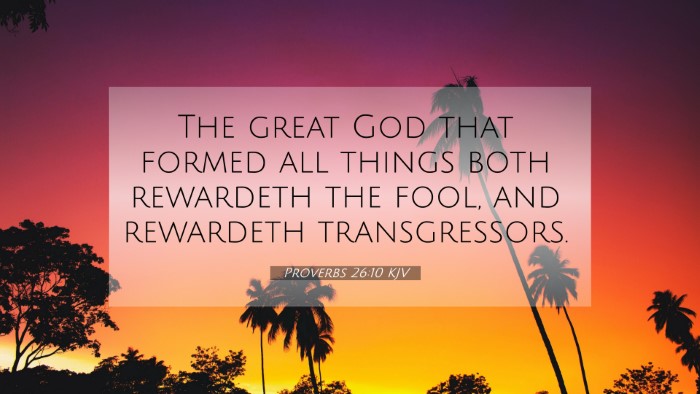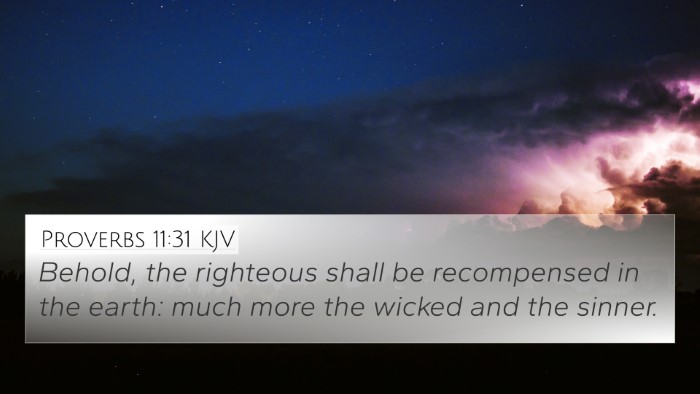Understanding Proverbs 26:10
Proverbs 26:10: "The great God that formed all things both rewardeth the fool, and rewardeth transgressors."
Summary of Meaning
Proverbs 26:10 serves as a reminder of God's sovereignty and justice. It underscores the concept that while God is the creator and sustainer of all, He holds individuals accountable for their actions, particularly those of fools and transgressors. The verse suggests that, ultimately, everyone will receive what they deserve based on their choices and behavior.
Insights from Commentaries
-
Matthew Henry:
Henry emphasizes the distinction made in this verse between the wise and the foolish. He notes that the "great God" ensures that every individual, whether they are wise or foolish, will encounter the consequences of their deeds. The analogy of a reward indicates that God is not indifferent; He actively engages with humanity and administers justice.
-
Albert Barnes:
Barnes points out that the fool, in this context, represents those who act without wisdom or consideration for God’s moral law. He suggests that rewards may come in different forms, not necessarily positive, as actions set forth by the individual render their own returns. The verse encapsulates the theme that divine retribution is fair and certain.
-
Adam Clarke:
Clarke observes that this proverb exemplifies a profound truth regarding divine justice. He argues that while the rewarded may appear to benefit in this life, the ultimate reward or punishment comes after death, emphasizing accountability before God. Clarke urges readers to reflect on their own actions to understand the implications of divine justice.
Cross-References and Connections
Proverbs 26:10 finds connections with several other scriptures, illustrating its themes of divine justice and accountability. Notable cross-references include:
- Galatians 6:7: "Be not deceived; God is not mocked: for whatsoever a man soweth, that shall he also reap."
- Matthew 16:27: "For the Son of man shall come in the glory of his Father with his angels; and then he shall reward every man according to his works."
- Romans 2:6: "Who will render to every man according to his deeds."
- Job 4:8: "Even as I have seen, they that plow iniquity, and sow wickedness, reap the same."
- Obadiah 1:15: "For the day of the Lord is near upon all the heathen: as thou hast done, it shall be done unto thee: thy reward shall return upon thine own head."
- 2 Corinthians 5:10: "For we must all appear before the judgment seat of Christ; that every one may receive the things done in his body, according to that he hath done, whether it be good or bad."
- Revelation 22:12: "And, behold, I come quickly; and my reward is with me, to give every man according as his work shall be."
Thematic Connections
When analyzing the themes of Proverbs 26:10, one can observe its relevance to various biblical teachings:
- Divine Sovereignty: The notion that God rules over all creation and is aware of human actions aligns with other verses portraying God's omniscience.
- Moral Accountability: The emphasis on personal responsibility resonates with teachings throughout Proverbs and the epistles, revealing the importance of choices in shaping destiny.
- Consequences of Sin: The fate of the fool is akin to teachings found in the Gospels, where Jesus often spoke about the moral laws and their implications for eternal life.
- Justice of God: Echoing throughout the scriptures, particularly in prophetic writings, the assurance of divine justice is a central theme that aligns with Proverbs 26:10.
Conclusion
Proverbs 26:10 stands as a profound reminder of the interplay between human action and divine justice. The verse speaks to the accountability of individuals before God, encouraging a life led by wisdom and understanding. By cross-referencing this proverb with various biblical texts, one can glean deeper insights into the consistent message of divine integrity across Scripture.
Tools for Exploring Cross-References
For those interested in delving deeper into the connections and thematic relevance of scripture, consider utilizing various resources and tools such as:
- Bible concordance for locating specific verses.
- Cross-reference Bible study guides to explore correlations.
- Online resources and software for cross-referencing biblical texts.
- Chain reference systems that provide thematic links.
- Comparative Bible studies that categorize similar themes throughout the books.




